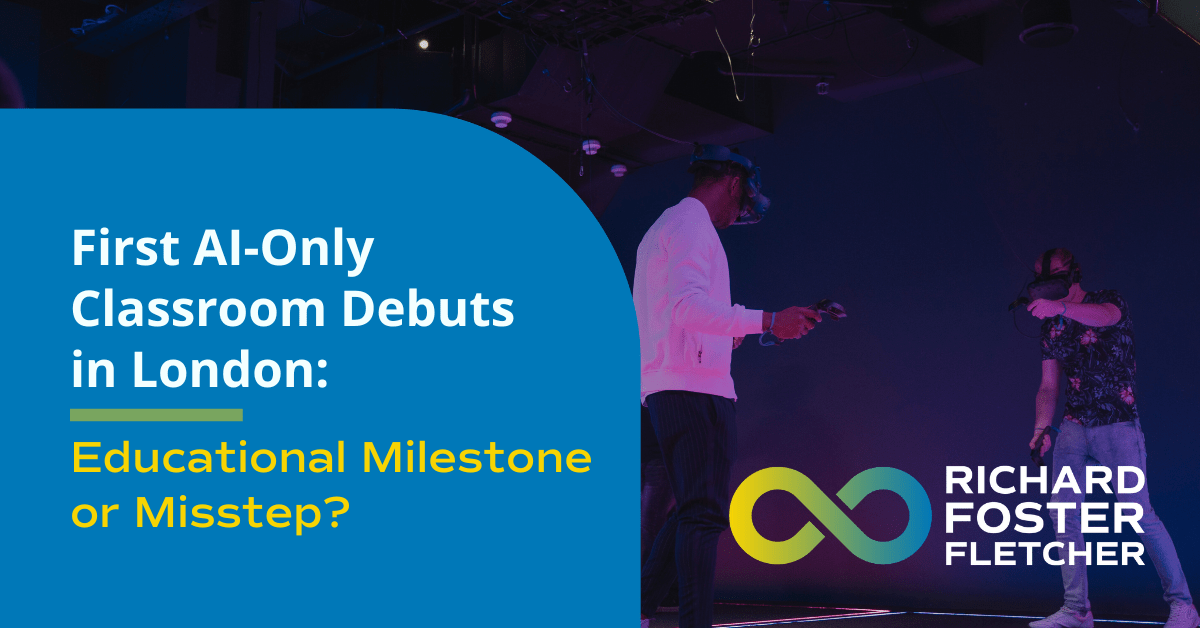
First AI-Only Classroom Debuts in London: Educational Milestone or Misstep?

David Game College in London has launched the UK’s first GCSE class entirely taught by artificial intelligence. This move represents a significant shift in educational practices, with the college charging £27,000 a year for this approach, which replaces traditional teachers with AI platforms and virtual reality headsets. The school argues that this model offers a more personalised education, with AI adapting lesson plans to each student’s strengths and weaknesses in real-time.
Precision vs. Human Interaction
John Dalton, co-principal of David Game College, claims that AI can achieve a level of precision and continuous evaluation that human teachers cannot match. According to Dalton, AI’s ability to identify specific areas where students struggle and adjust their learning schedules accordingly is superior to traditional teaching, where teachers often miss individual nuances due to the demands of managing multiple students simultaneously.
However, critics like Chris McGovern, a former advisor to 10 Downing Street and head of the Campaign for Real Education, argue that this reliance on AI could lead to a dehumanised learning environment. McGovern warns that the lack of human interaction—essential for developing interpersonal skills and emotional intelligence—could result in a “soulless, bleak future.” His concerns are not about a sentimental attachment to traditional methods but rather a critique of AI’s inability to foster the critical teacher-student relationships that are crucial for comprehensive development.
The Hybrid Approach: Balancing Technology with Human Oversight
Despite these criticisms, David Game College is pressing ahead with its AI-driven classroom, defending the decision as an investment in a more effective educational model rather than a cost-saving measure. To address areas where AI currently falls short, such as art and sex education, the college has employed additional staff known as “learning coaches.” These coaches are responsible for monitoring students and providing necessary support, attempting to balance the precision of AI with the essential role of human oversight. However, the balance clearly leans towards technology.
The Broader Implications of AI in Education
The debate over AI in education reflects larger societal concerns about the increasing role of technology in fields traditionally dominated by human expertise. While AI has the potential to revolutionise education through tailored learning experiences, it raises critical questions about what is lost when human teachers are replaced. Education is not just about transferring knowledge; it also involves inspiring curiosity, fostering critical thinking, and nurturing emotional and social development—areas where AI, regardless of its advancements, is likely to fall short.
The Digital Divide and Educational Inequality
The reliance on AI in education could also exacerbate existing inequalities. While students at David Game College can afford the £27,000 annual fee for access to cutting-edge technology, students in less affluent schools are unlikely to benefit from such resources. This could lead to a two-tier education system, where only the wealthy receive the bespoke learning that AI promises, while others are left with underfunded and outdated educational tools. This digital divide threatens to deepen existing social inequalities, making it harder for students from disadvantaged backgrounds to compete.
Government Support and the Future of Teaching
The UK government’s recent announcement of a project to help teachers use AI more effectively, including a repository of anonymised lesson plans to train educational AI models, signals a push towards greater integration of technology in schools. While this may be seen by some as a step forward in modernising education and reducing teachers’ workload, it also raises concerns about the direction in which education is heading. Stephen Morgan, the Minister for Early Education, describes AI as an “exciting opportunity” to assist teachers, yet the reality is that AI is increasingly taking over roles traditionally filled by human educators.
Data Privacy and Security Concerns
The introduction of AI-driven classrooms also raises significant data privacy and security concerns. The AI platforms used to personalise learning collect and analyse student data, which leads to questions about who controls this data and how it is used. In an era where data breaches are becoming more common, the security of sensitive educational data is a serious issue. Schools must ensure that the data collected by AI systems is secure and handled ethically, particularly when it involves minors. Failure to protect this data could lead to severe consequences, including breaches of trust and legal repercussions.
The Cautionary Path Forward
While the use of AI in education offers certain advantages in terms of personalisation and precision, it also presents significant challenges that cannot be ignored. The potential for a dehumanised learning environment, the exacerbation of educational inequalities, and concerns about data privacy are all issues that must be addressed as AI becomes more integrated into the classroom. David Game College’s experiment with a teacherless GCSE class may represent a glimpse into the future of education, but it is a future that requires careful consideration and responsible implementation. The success or failure of this initiative could set a precedent for the role of AI in education for years to come.
















